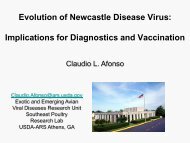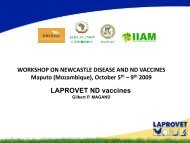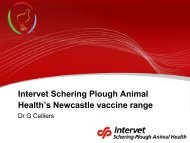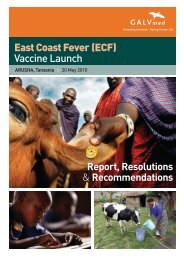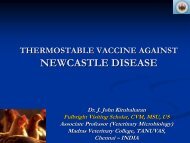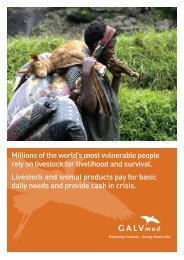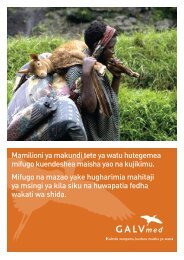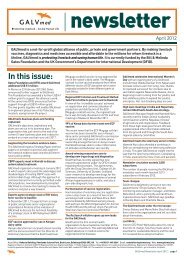A Path to Prosperity New Directions for African Livestock
GALVmed Impetus Strategy Paper
GALVmed Impetus Strategy Paper
- No tags were found...
You also want an ePaper? Increase the reach of your titles
YUMPU automatically turns print PDFs into web optimized ePapers that Google loves.
The highest number of discussion posts made were<br />
on animal health issues. Key points included the<br />
following:<br />
> Vets, as a first point of contact with lives<strong>to</strong>ck<br />
owners, have a (largely missed) opportunity <strong>to</strong><br />
provide in<strong>for</strong>mation on improved feeding<br />
practices.<br />
> Opinion on whether veterinary para-professionals<br />
are effective and sustainable, whilst divided, was<br />
generally positive. Paravets are useful, particularly<br />
in underserved and remote areas. Most agreed<br />
that World Organisation <strong>for</strong> Animal Health (OIE)<br />
guidance on how paravets should operate was<br />
useful and appropriate. Calls <strong>for</strong> effective<br />
supervision and follow up, improved trust and<br />
flexible legislation <strong>to</strong> govern the use of paravets<br />
including Community Animal Health Workers<br />
(CAHW) were made. There were calls <strong>for</strong><br />
effective continuing professional development<br />
of vets <strong>to</strong> help improve service provision and<br />
the utilisation of paravets.<br />
> There were several observations made about<br />
how paper policies and weak institutions don’t<br />
lead <strong>to</strong> positive change <strong>for</strong> the sec<strong>to</strong>r.<br />
> We heard that whilst drug regulation had been<br />
harmonised and improved in some regions,<br />
it is not en<strong>for</strong>ced and there<strong>for</strong>e inadequate.<br />
Contribu<strong>to</strong>rs confirmed that drug acquisition<br />
remains largely in<strong>for</strong>mal and the quality of<br />
drugs continues <strong>to</strong> fall. Various solutions<br />
ranging from training drug vendors, <strong>to</strong> building<br />
franchise enterprises (Sidai Africa Ltd) and<br />
ensuring drug registration authorities have<br />
an incentive <strong>to</strong> change the way they do business<br />
were put <strong>for</strong>ward.<br />
> The OIE PVS mechanism, the new Interafrican<br />
Bureau of Animal Resources [AU/IBAR]<br />
veterinary governance project and IBAR’s<br />
strategy <strong>for</strong> lives<strong>to</strong>ck development in Africa were<br />
cited as key opportunities <strong>to</strong> build upon.<br />
> Controlling neglected zoonoses needs more<br />
than improved education and infrastructure.<br />
Partnerships with other sec<strong>to</strong>rs, particularly<br />
human health, but also agriculture,<br />
environment, education, local administration,<br />
will be necessary <strong>to</strong> contain and effectively<br />
control zoonotic and food borne diseases that<br />
mainly affect the poor.<br />
The lives<strong>to</strong>ck nutrition discussion made numerous<br />
points some examples include the following:<br />
> It is important <strong>to</strong> assess available feed resources<br />
at national level.<br />
> Once feed inven<strong>to</strong>ry in<strong>for</strong>mation is available it is<br />
possible <strong>to</strong> generate a feed balance sheet at<br />
country level and carry out proper planning <strong>for</strong><br />
the lives<strong>to</strong>ck industry.<br />
> There is a need <strong>to</strong> put in place quality control<br />
systems in animal feed analysis labora<strong>to</strong>ries.<br />
> Many productivity and health problems should<br />
be simple <strong>to</strong> solve. It was pointed out that<br />
smallholder farmers rarely feed a balanced<br />
ration <strong>to</strong> ruminants and the need <strong>to</strong> ensure<br />
adequate micro nutrients, vitamins and minerals<br />
was stressed.<br />
> Indigenous knowledge and practices on feeding<br />
and range management were recognised. There<br />
was a call <strong>to</strong> work directly with communities<br />
understand how they utilise local feed resources<br />
and how this is changing.<br />
> Improving the nutrition of extensively grazed<br />
lives<strong>to</strong>ck, particularly in pas<strong>to</strong>ralist societies,<br />
appears <strong>to</strong> be challenging. Whilst there were<br />
calls <strong>for</strong> pasture improvement and fodder banks,<br />
it was not clear how <strong>to</strong> sustainably improve the<br />
nutrition of grazed lives<strong>to</strong>ck when access <strong>to</strong><br />
quality grazing lands is increasingly restricted.<br />
During the discussion on market access <strong>for</strong> small<br />
holders it was pointed out that product type and<br />
policies are the key issues <strong>to</strong> consider. For example,<br />
small holders and medium sized poultry operations<br />
can rarely compete with large scale egg and poultry<br />
meat producers however small scale milk and<br />
possibly ruminant meat production can be<br />
competitive depending on the policy environment.<br />
Our understanding of how some small holder<br />
markets function remains weak.<br />
Small and poor farmers will inevitably drop out of the<br />
market place in coming years and this may not be a<br />
bad thing as long as alternative livelihoods options<br />
and safety nets are available <strong>for</strong> the most vulnerable.<br />
The harmonisation of intra and inter regional<br />
lives<strong>to</strong>ck trade policies in Africa should encourage<br />
better structured and regulated markets and this<br />
could be very beneficial <strong>for</strong> small farmers.<br />
The Impetus Strategy Paper I Page 83



